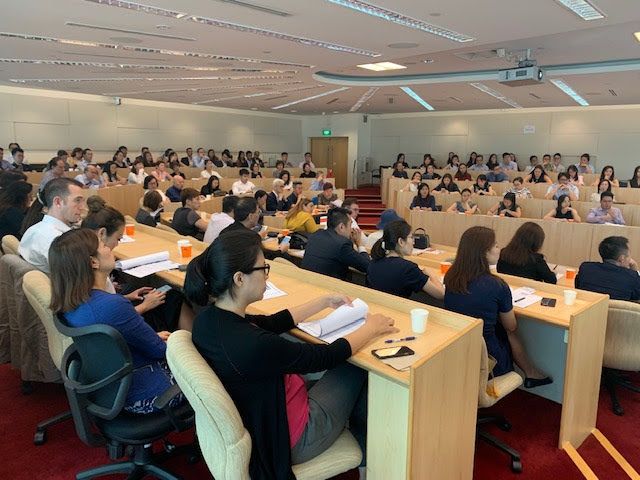Articles
21 July 2020
Survey shows that Singaporeans are ill-prepared for end of life and incapacitating events
Singaporean adults need to ensure they are much better prepared for end-of-life events and incapacity, says STEP, the worldwide association for those advising families across generations, after a survey of 495 people found only 28% have a finished will and, of those, a significant proportion feel it is not adequate or up-to-date.
A further 56% of respondents reported they had no will at all, while the remaining 16% said their will was currently under development. The survey also reveals that 39% have no delegations or directives in place should they become incapacitated, such as Lasting Powers of Attorney, and a huge 80% do not have life insurance.
STEP says the numbers show that the ‘it will never happen to me’ mentality is alive and well in Singapore and people should think much more carefully about preparing for end-of-life events and incapacity. STEP is calling for more education, particularly with respect to issues like the impact of digital technology and trusts on the administration and succession to their property. Irrespective of culture, age, occupation and income, death and disability are issues that all adults need to consider if they want to ensure their wishes are carried out.
Findings include:
- 56% of adult Singaporeans do not have a will. Of those remaining, 14% have one that is up to date, 14% say they have one but it is inadequate or does not properly express their wishes, and 16% have no will currently but claim to have one in development.
- People are relatively more unprepared for disability and incapacity than they are for death, with only 39% of those responding saying they have lasting powers of attorney or delegations in place.
- 80% of all respondents do not possess life insurance.
- Of those respondents who have children, just 34% have nominated a guardian in the event of death, which potentially places the children of the other 66% at risk of family disputes and the cost/disruption of court cases.
- 62% of those who own businesses do not have a succession plan. While it is common for Singaporeans to jointly own assets, most who did were unaware of what will happen to those assets if they died or became incapacitated.
- Singaporeans are known for their adoption of technology and most are immersed in the digital world with multiple digital assets. However, 65% indicated that they were unaware of what would happen to these assets in the event of their death.
Bock Eng Sim, Branch Chair at STEP in Singapore, said:
"Research on estate planning and the factors that impact estate planning decisions is relatively limited in Singapore. This survey provides an interesting insight into Singaporeans and is consistent with the lament of asset owners as they look to the development of the COVID-19 situation in Singapore and across the world that they have not made adequate arrangements for their families and loved ones. Singaporeans are not adequately prepared for end of life and disability. The results point to the need for more education on the importance of planning for your family’s future, and the role that STEP-qualified advisers can play in this.”
Notes to Editors
About the research:
The research was led by STEP Academic Community members, Professor of Practice Adam Steen and Mr Marc Olynyk from Deakin University, and Professor Steve D’Alessandro from the University of Tasmania. The report sets out the results of on an online survey of the general population in Singapore. The survey invited people to share their experience and engagement with estate planning and various issues surrounding the intergenerational transfer of assets.
You can view the full report, Estate Planning in Singapore: A research report by the STEP Academic Community, here: https://www.step.org/research-reports/research-reports.
About STEP:
STEP is the global professional association for practitioners who specialise in family inheritance and succession planning. STEP works to improve public understanding of the issues families face in this area and promotes education and high professional standards among its members. STEP members help families plan for their futures, from drafting wills to issues surrounding international families, protection of the vulnerable, family businesses and philanthropic giving. Full STEP members, known as TEPs, are internationally recognised as experts in their field, with proven qualifications and experience.
STEP Singapore was first established as a chapter of STEP in 1997 and to date has more than 700 members comprising experts and professionals skilled and trained in all aspects of estate, trust, succession and wealth planning. For more details about the Singapore Branch, please visit https://www.step.org.sg/.
ENDS
Read other news coverage of this media release here:
Are the present worldwide initiatives a stride towards an era of global tax communism, and away from competition and capitalism?
The present tax landscape seems to be borrowing many principles from communist ideas, this time round, not as to how the economy should be run, but as to how tax systems should be managed. For instance, the underlying idea of the base erosion profits shifting (BEPS) project and common reporting standards (CRS) appears to be that there will be a de facto centralised system of taxation where the tax authorities of the world get together to maximise tax collections and to distribute the tax collected so that each tax authority gets a ‘fair share of tax’.
There is a dire need for many governments in the world to collect more revenue to fund their budget deficits. But is the present approach the right way to go about it, and is the idea of ‘harmful tax competition’ possibly erroneous?
A fundamental belief of capitalism is that competition acts as the ‘invisible hand’ that selects the fittest for survival. Will attempting to eliminate ‘harmful tax competition’ really lead to efficiency and maximisation of tax collections? Or will it instead lead to the development of inefficient tax systems with multiple disputes between tax authorities and taxpayers worldwide as to what is their ‘fair share of taxes’?
What is the true objective of tax policy? To collect as much tax as possible immediately, or to facilitate business growth by eliminating double taxation with the objective of ultimately increasing the profits for taxation?
This in turn leads to further questions: Will the present tax policies in fact lead to fewer businesses and decreased profits available for tax, thereby increasing the intensity of the fight for ‘fair share of taxes’ amongst the survivors? And if there are fewer businesses generating fewer profits, where will the increased tax collections come from?
The present state of the world economy is bad, and looks likely to worsen. Will such tax policies penalise smaller businesses and entrepreneurs out of existence, and freeze the status quo by facilitating survival of the present large multi-national companies who can afford the astronomical compliance costs in an environment of tax uncertainty?
Gigantic MNCs with their gargantuan compliance machinery appear equipped to handle the medusa-like complexity and constantly changing regulation. The increased volume and complexity of regulation may however effectively kill off the smaller competitors. These are the very companies not actively engaged in complicated tax-planning and bear a significant portion of the tax burden. Even if such tax polices do not kill off the smaller competitors, the increased compliance and complexity will inhibit their ability and desire to expand cross-border, due to the increased exposure to double or multiple taxation. Global trade may shrink further, and smaller companies may be wiped out, leaving the markets dominated by large monopolistic giants.
The ideals of communism are admirable: equality and fairness for one and all. The attractiveness of these ideals brought about revolutions, toppled governments and caused whole nations to subscribe to these ideals. But its practical track record and results have been questionable.
There is a need to strike a balance in ensuring a fair system for the rule of law, so that egregious tax evaders do not profit at the expense of other law-abiding taxpayers. Taxes are necessary to run a civilised society smoothly for the good of its citizens. At the same time, business and economic activities should not be paralysed in a complex world environment of anti-tax competition regulation and tax uncertainty, which would cripple business activities and ultimately lead to reduced tax collections.
Contributor : Random thoughts and questions by a law-abiding taxpayer







